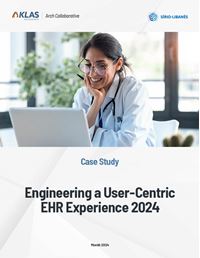

Engineering a User-Centric EHR Experience
Sírio-Libanês Hospital addressed the initial challenges of their EHR implementation by developing a seamlessly integrated clinician portal, engaging physicians collaboratively, and continually upgrading the system to enhance user experience and patient care outcomes.
Publish Date: 01/03/2024
| Cost to Implement: | $$$ - Board Approved Cost |
| Time to Implement: | >2 years. |
Program Goals
- To improve patient care by enhancing the user-friendliness of the EHR
Organization Outcomes
- 99th percentile for physician agreement that the EHR enables efficiency
- 99th percentile for physician agreement that the EHR enables patient-centered care
- 100th percentile for physician agreement that the EHR is easy to learn
Collaborative-Verified Best Practices
- Clinician Efficiency and Personalization
Keys to Success
- Involve physicians in developing EHR enhancements
- Ensure the most commonly used functions are easy to access in the EHR
- Seek user feedback from multiple channels
What Sírio-Libanês Hospital Did
After their EHR implementation, Sírio-Libanês Hospital measured through an internal survey, and the data uncovered challenges with the initial EHR user experience linked to patient safety concerns. To address concerns and ensure that the EHR could better meet clinicians’ needs, the organization created a clinician portal that seamlessly integrates with the EHR, making important clinical functions more accessible. This collaborative development, which was done following agile methodologies, achieved success because physicians were actively involved and provided valuable feedback and suggestions. Over the years, the organization continuously upgraded both the EHR and the integrated clinician portal to meet evolving healthcare needs. Because the portal is directly integrated with the main EHR, physicians have swift access to clinical information, and the portal facilitates decision-making. Sírio-Libanês Hospital engaged multiple teams, including IT professionals, administrative personnel, and clinical teams to refine the EHR through a multidimensional feedback approach. Their tailored training process was designed for various departments and healthcare professionals, utilizing digital resources to address navigation and process challenges. This commitment to clinical system excellence has empowered the organization’s physicians to prioritize patient-centered care and has led to tangible improvements in patient outcomes.
How Sírio-Libanês Hospital Did It
Access the feedback of
500,000+ clinicians worldwide
Access the feedback of
500,000+ clinicians worldwide
Here is my information:
Featured in Learning Tracks
Topics
EHR PersonalizationReader Responsibility
These perspectives are shared to facilitate better collaboration and communication between members of the Arch Collaborative. We encourage organizations to thoughtfully adjust their current operations based on their own experience, the findings of this research, and other complementary sources of information.
Copyright Infringement Warning
This report and its contents are copyright-protected works and are intended solely for your organization. Any other organization, consultant, investment company, or vendor enabling or obtaining unauthorized access to this report will be liable for all damages associated with copyright infringement, which may include the full price of the report and/or attorney’s fees. For information regarding your specific obligations, please refer to the KLAS Data Use Policy.

Arch Collaborative Mission
Unlock the potential of EMR solutions to revolutionize healthcare efficiency and care-quality improvements by facilitating collaboration, measurement, and shared learning.
The Arch Collaborative is committed to finding and sharing healthcare technology best practices that forward the efforts of the quadruple aim in healthcare. The engine of the Arch Collaborative is the insights and feedback of thousands of clinicians and caregivers around the world.
Learn more about the Arch Collaborative: https://klasresearch.com/arch-collaborative
The Arch Collaborative is a service of KLAS Research: klasresearch.com
About Arch Collaborative Case Studies
Arch Collaborative case studies are focused on highlighting success that Collaborative participants achieve with or through healthcare technology. They are meant to briefly advertise member success and act as starting points for ongoing communication and collaboration between member organizations.
Case studies are typically published when (1) a verified outcome is recorded (and often verified through the Collaborative survey) and (2) the approach or steps to achieving that outcome aren’t commonly known and would be helpful to other organizations.
All Collaborative members and participants are invited to submit case studies by working with their KLAS guide.
All case studies can be viewed at: https://klasresearch.com/learningcenter/casestudies
 |
KLAS | ® |


